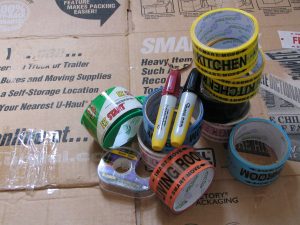Fees and costs to factor in when defining your moving budget
Moving involves a long and expensive to-do list. While you are choosing a place to live and deciding which long distance moving company Miami to hire, make a spending plan so you don’t go over your budget. To ease stress when defining your moving budget, think about these less obvious moving costs.
What costs should you consider when defining your moving budget
1. Packing materials and equipment
Buying items such as boxes, bubble pack, and packing tape can cost some serious money. For example, you can get large moving boxes for $1.67 to $1.99 a piece, depending on how much you buy. Be realistic about the amount you need to avoid costly miscalculations. Also, think about the items you will need to safely transport your belongings, including furniture covers, handcarts, and elastic cords. If your movers don’t provide them, or you don’t hire professionals, renting or borrowing is more affordable than buying.

2. Excess cargo
The more things you take, the more you pay. Long distance moving companies Orlando usually count the number and weight of items on the bill. Expect additional fees for valuable or large items such as a piano that require extra time, space, or labor. Moving everything yourself? More load may require a larger vehicle or more gas trips. To save money, donate or sell whatever you can before you move.
3. Peak surcharges
Many moving and truck rental companies raise rates during peak times such as summer and weekends. If you have flexibility, move during off-peak periods to save money.
4. Cleaning
You will most likely need to tidy up your current location, especially if the deposit is at stake. Cleaning services typically charge between $125 and $300 for a single cleaning. You will save money by doing some or all of the work yourself.
5. Utilities
Pay attention to the security deposit, taxes, connection and installation fees when setting up utilities at a new address. They can range from $10 to $200 or more. Check with your electricity, internet, and other service providers about costs in advance. Some will waive the commission for customers with satisfactory payment history.
6. Lost or damaged items
Some things may not survive the move. Depending on what you are transporting and how far, it may be worth purchasing protection to repair or replace property. Nobody wants to think that their things will break.

Most cross country movers provide basic coverage that limits their liability to 60 cents per pound per unit. If you have homeowner or renter insurance, you probably have some kind of coverage.
7. Storage
If you can’t move your belongings to your new home right away, you may need to rent self-storage space. The costs of public storage facilities depend on size and location. The less time and space you need, the cheaper the unit will be.
Prepare your moving budget
Walk mentally through the process of moving from start to finish. Identify potential products and services that you will need at least a month in advance. Then research the prices and get a few evaluations of the best deals and services. Only then you can start defining your moving budget and making a detailed plan for your move.

